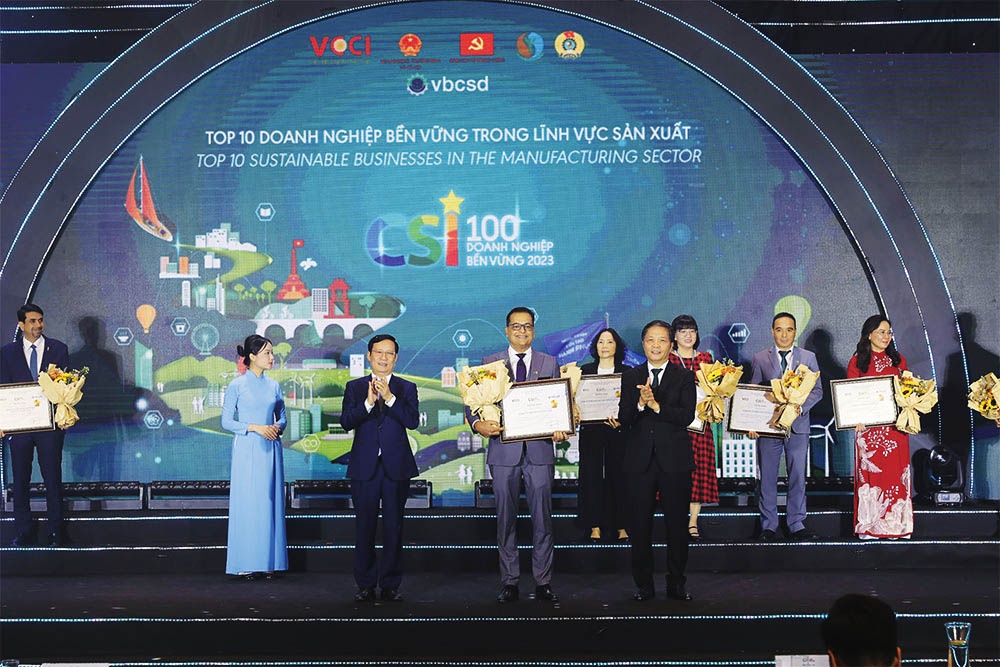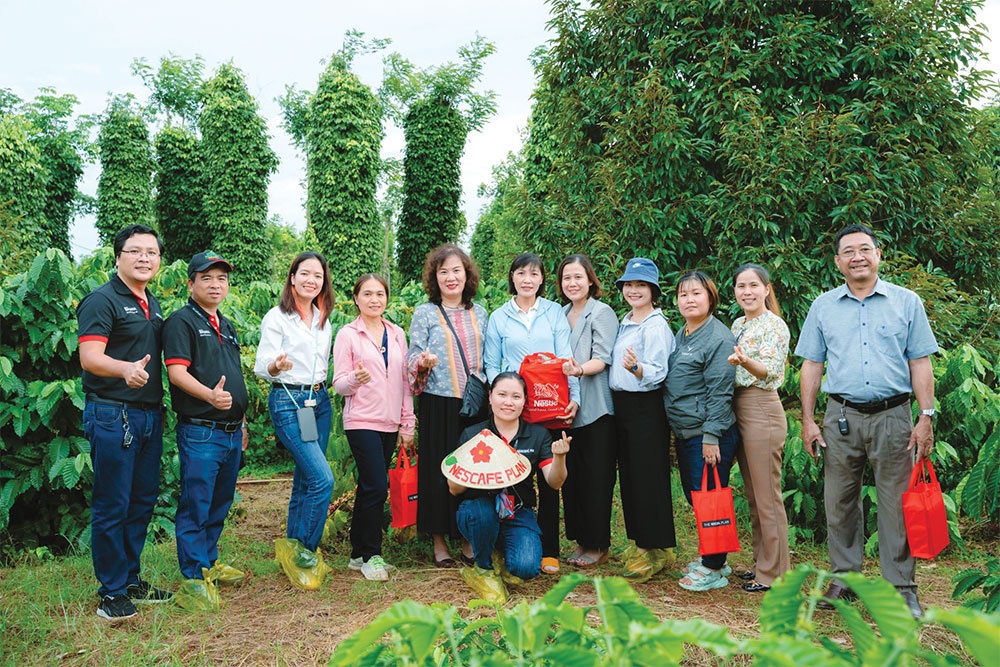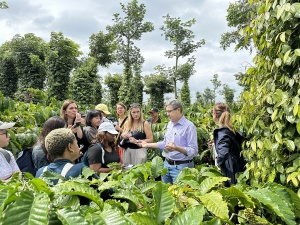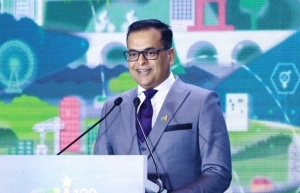CSI100 reaffirms Nestlé Vietnam’s leading sustainability position
 |
As a co-chair of the Vietnam Business Council for Sustainable Development, how does Nestlé evaluate the effectiveness of Vietnamese businesses in sustainable development?
COP28 provided us with a reality check on how far the world has come in tackling the climate crisis and how much of a course correction is still needed. However, we can also take stock of what the council has accomplished in the last 12 years and how much more needs to be done.
As a co-chair, I am thrilled that in recent years, we have had more and more companies to join the Corporate Sustainability Index’s CSI100 list with a lot of good sustainability practices applied by our members. It is clear that the business community has been contributing significantly to the green growth of the country.
A lot has been done, but we all know that this is not enough. To solve the world’s climate change crisis, we need to do more for nature as well as for you, me, and our future generations. This requires strong and continued leadership commitment, organisational alignment, and a transformation that starts from each one of us.
I am convinced that members will be pioneers in this mission and continue to work together to build a better tomorrow.
Nestlé Vietnam just had its third win in a row as the top enterprise in the Top 100 Sustainable Companies award. What has the company done to achieve this?
The recognition is a testament to our unwavering commitment to long-term investment and the sustainable development of Vietnam. We are proud to be at the forefront of this movement, leading the way towards a greener and more sustainable future. However, we don’t take this as a privilege but a responsibility.
In Vietnam, our sustainability strategy focuses on four pillars: climate action, sustainable packaging solutions, responsible sourcing, and water stewardship.
 |
| Nestlé Vietnam and the Vietnam Women’s Union visited a female farmer leader in the NESCAFÉ Plan and Chi Nest inititiave in Dak Lak |
Our sustainability programmes have created a positive impact on communities, the environment, and the planet. Our NESCAFÉ Plan, implemented in the Central Highlands provinces since 2011, has helped over 21,000 farming households practice coffee production. The project also places emphasis on supporting farmers in coffee cultivation. So far, 73.5 million high-yield, disease-resistant coffee plantlets have been distributed to farmers.
The programme also contributes to reducing fertiliser use by 20 per cent, saving 40 per cent of irrigation water, and increases farmer incomes via applying regenerative agriculture and reasonable intercropping.
Besides that, Nestlé Vietnam has been implementing various initiatives to contribute to community development.
Typical activities include the Milo Active Vietnam programme in partnership with the Ministry of Education and Training that has reached 5 million children, and the “Nestlé Accompanying Women” programme in partnership with the Vietnam Women’s Union, with participation of over 5,000 women in 21 provinces.
What special strategies has Nestlé come up with to achieve a positive social impact?
The theme of this year’s CSI100 award ceremony, “the journey of creating happiness”, serves as a powerful reminder that the role of business goes beyond delivering shareholder value. It is our responsibility to create a positive social impact, to contribute to a wealthier community, a happier workplace, and regenerative and sustainable future.
The COP28 presidency put food systems transformation on the global climate agenda as more than 130 world leaders, including Vietnam, endorsed a food and agriculture declaration. It is the first time at COP that a member state declaration has been matched in a coordinated way with a call to action from non-state actors.
As a food company, Nestlé has been pushing for this action and believes the momentum it creates will enable the global transition to agriculture that restores and enhances nature.
We have made regenerative agriculture a cornerstone of our roadmap to net-zero greenhouse gas emissions. As a company, we can have a positive impact on the environment and on farmers and their communities.
In Vietnam, we have implemented several initiatives to create positive value to the community, for instance the NESCAFÉ Plan with a regenerative agriculture approach. Going forward, we will continue to pursuit our commitments in our four main areas through various initiatives and programmes. We are happy to share our experiences and success stories with others.
What were Nestlé Vietnam’s initiatives in terms of implementing environmental, social, and governance criteria this year?
For the environmental aspect of the criteria, Nestlé launched an agroforestry and reforestation project in Vietnam, aiming at planting more than 2.3 million trees which help absorb and store about 480,000 tonnes of CO2 between this year and 2027.
The company also stepped up implementation of the circular economy and using renewable energy to help reduce 25,000 tonnes of CO2 in coffee production annually.
In addition, we also have programmes on water stewardship and water saving and converting to sustainable packaging. Currently, up to 90 per cent of Nestlé’s product packaging is designed to be recycled, and the company also aims to reduce the use of virgin plastic products, which will decrease to a third by 2025.
We are also working on a number of social initiatives, including how to make children in Vietnam more active. Every year, five million children are taught exercises to stay more active.
At the same time, with the Chi Nest initiative, Nestlé has supported 5,000 women who have been educated on nutrition, digitalisation, and also on their empowerment, trying to create entrepreneurship opportunities for women. We also promote responsible sourcing, supporting farmers’ livelihood and promoting gender balance.
Nestlé Vietnam is also interested in building an optimal working environment for employees. Recently, we were honoured as one of the best places to work in Vietnam this year for large enterprises, as announced by Anphabe. This confirms Nestlé’s position in attracting, developing, and nurturing talent, and is a driving force for the company to continue building a professional, sustainable working environment.
In terms of governance, Nestlé believes that successful implementation requires commitment, leadership, organisational alignment, and cultural transformation. Therefore, we have set the sustainability council with a clear structure, including all board members and key decision makers of the company.
 | Nestlé promoting Vietnamese coffee to the world Nestlé Vietnam organised a trip for international media to visit coffee gardens under the NESCAFÉ Plan model and its coffee processing factories. |
 | Nestlé Vietnam leads Top 100 Sustainable Companies Nestlé Vietnam continues to lead the Top 100 Sustainable Companies (CSI) in 2023 in the manufacturing sector. The company is also among the five most pioneering enterprises in implementing circular economy solutions and carbon emissions reductions. |
What the stars mean:
★ Poor ★ ★ Promising ★★★ Good ★★★★ Very good ★★★★★ Exceptional
Related Contents
Latest News
More News
- Ho Chi Minh City launches plan for innovation and digital transformation (February 25, 2026 | 09:00)
- Vietnam sets ambitious dairy growth targets (February 24, 2026 | 18:00)
- Masan Consumer names new deputy CEO to drive foods and beverages growth (February 23, 2026 | 20:52)
- Myriad risks ahead, but ones Vietnam can confront (February 20, 2026 | 15:02)
- Vietnam making the leap into AI and semiconductors (February 20, 2026 | 09:37)
- Funding must be activated for semiconductor success (February 20, 2026 | 09:20)
- Resilience as new benchmark for smarter infrastructure (February 19, 2026 | 20:35)
- A golden time to shine within ASEAN (February 19, 2026 | 20:22)
- Vietnam’s pivotal year for advancing sustainability (February 19, 2026 | 08:44)
- Strengthening the core role of industry and trade (February 19, 2026 | 08:35)

 Tag:
Tag:




















 Mobile Version
Mobile Version